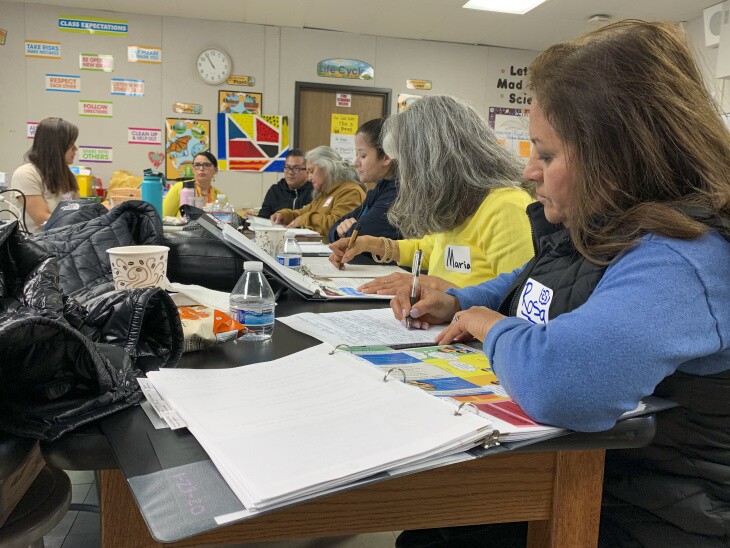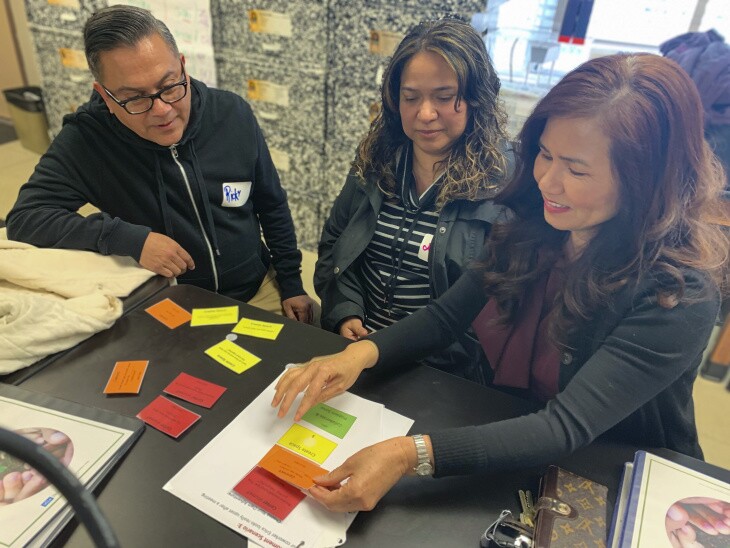Helping Preschoolers Work Through Trauma, One Breath At A Time

The Los Angeles Unified School District knows many of its students will experience trauma before they graduate. Living in poverty, witnessing violence and not having two parents are all examples of situations that can hurt a child's development and their success later in school.
"Every year we get new kids and every year that is passing by, we get more challenging kids," said Rosa Miranda, a teacher at Lemay Early Education Center in Van Nuys. She's had children throw toys or chairs in the midst of a meltdown.
This year, for the first time LAUSD is preparing teachers like Miranda to work with students who may have experienced trauma at home. It's offering a six-week training called SEEDS, from UCLA's Nathanson Family Resilience Center atfive early education centers.
I looked in on one of the training sessions at the Vanalden Early Education Center in Tarzana.
LESSONS FROM A SONG

Psychiatric social worker Nancy Dimacali led a group of early educators in a familiar nursery rhyme.
"Jack be nimble, Jack be quick, Jack jumped over a candlestick! Jack jumped hiiiiigh!"
As she waved orange and green scarves over her head, Dimacali took a deep breath.
"Jack jumped looooow."
And then blew the air out through her mouth as she reached for the floor.
The song is a breathing exercise in disguise.
It's one way Dimacali showed the teachers how they can help students learn to calm themselves.
In LAUSD, there are 15 psychiatric social workers stationed at early education centers who are available for consultations with teachers. A three-year, nearly $10 million grant from L.A. County is supporting the district's efforts to boost mental health services for the youngest students.
The district is working with the The UCLA Prevention Center of Excellence to evaluate whether these efforts make a difference toward goals like increasing school attendance and kindergarten readiness.
LAist only exists with your support.
No paywalls here: just free, independent journalism for you and your city. Donate now.
LAUSD plans to expand the training to more schools, as it becomes increasingly aware of students' exposure to trauma.
The district screened nearly 20,000 students in grades 4 through 12 last school year and found about 34% were at moderate to high risk oftraumatic stress. Overall, almost 61% of people in Los Angeles County reported at least one traumatic experience as a child.

LAUSD school mental health coordinator Kezia Miller likes this definition of traumatic stress:reactions that "interfere with the child's daily life and ability to function and interact with others."
Long term,ACEs, or adverse childhood experiences, are linked to an increased risk for health issues like alcoholism, heart disease and depression.
In the short term, kids might have trouble regulating their emotions.
"If you're constantly in a state of agitation you can't possibly take in new information," Miller said. "You can't learn."
University of San Francisco psychiatry professor Joyce Dorado has seen this firsthand in almost three decades as a psychologist working with kids and families who have experienced trauma.
She said if teachers interpret a student's behavior as defiance, it's harder to form a close positive relationship that can help a kid work through her trauma.
"Caring stable adults are incredibly important and central to children being resilient in the face of adversity," Dorado said.
COACHING THEIR WAY TO CALM

Back at Vanalden, teachers practiced coaching a student through an outburst.
Special ed assistant Ricky Melena took on the role of the adult while a colleague played a girl who falls and begins to cry.
Melena took a few deep breaths and knelt down.
"I understand how you feel," he said in a calm, even voice. "Let's take three deep breaths together."
Melena did exactly what he was taught - he stayed relaxed and suggested an activity that would help both teacher and student calm down together.
"The old-fashioned way would be like, 'I'm the adult and you listen and you're supposed to do what I tell you,'" Melena said.

Melena has welcomed the classes. He said when he started in early education almost 30 years ago, there wasn't any training - just paperwork.
This is the first time he's learned about how trauma could be affecting the kids in his classroom.
"There's specific tools ... instead of just telling the child 'no' or coming at it in a negative light, we're able to redirect that behavior and turn it into something positive," Melena said.
Research showsthat kids who learn to manage their emotions and control their behavior are more likely to do better in school later on.
There isn't any definitive research on which practices are best for teaching these skills or what the long-term effect on students and teachers might be.
In San Francisco, Dorado has also developed a trauma-informed curriculum and reviewed other programs. She says schools need to use multiple strategies.
"You can't just do a training and think that you're done," she said.
Teacher Robin Callahan has started to incorporate deep breathing into her preschool class with the help of YouTube and a friendly cartoon blowfish.
"It is actually helping me to be able to help myself plus them," Callahan said.
The lessons about childhood trauma resonate with Callahan. She was 6 years old when she watched her younger sister die in her mother's arms.
"I never got to be able to help myself until I was an adult," Callahan said.
She enjoys watching her students laugh when they see bubbles stream from the blowfish's mouth in the video.
"It brings them more joy and calmness instead of the anger and frustration," Callahan said.
-
The severe lack of family friendly housing has millennial parents asking: Is leaving Southern California our only option?
-
As the March 5 primary draws closer, many of us have yet to vote and are looking for some help. We hope you start with our Voter Game Plan. Since we don't do recommendations, we've also put together a list of other popular voting guides.
-
The state's parks department is working with stakeholders, including the military, to rebuild the San Onofre road, but no timeline has been given.
-
Built in 1951, the glass-walled chapel is one of L.A.’s few national historic landmarks. This isn’t the first time it has been damaged by landslides.
-
The city passed a law against harassing renters in 2021. But tenant advocates say enforcement has been lacking.
-
After the luxury towers' developer did not respond to a request from the city to step in, the money will go to fence off the towers, provide security and remove graffiti on the towers.






